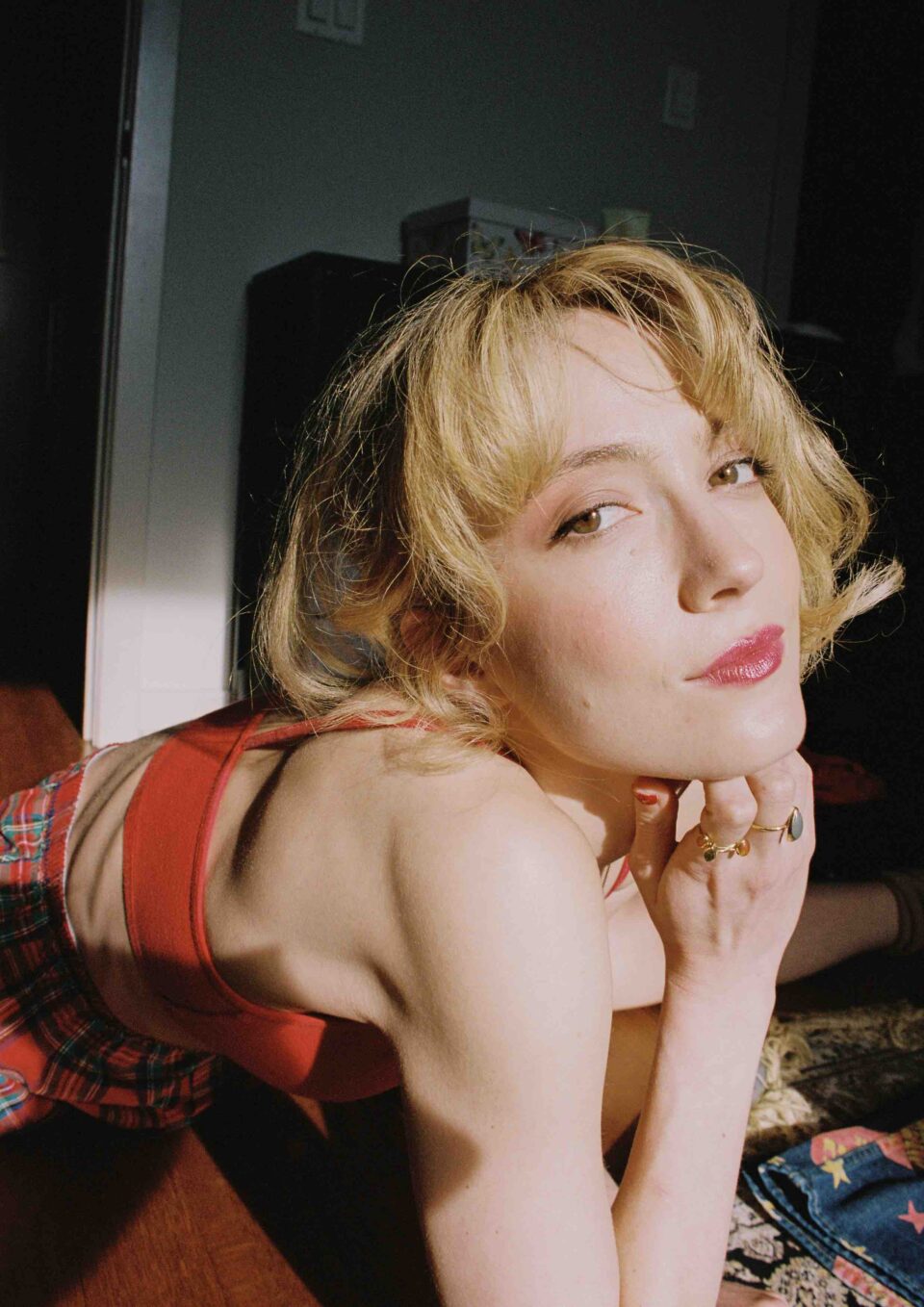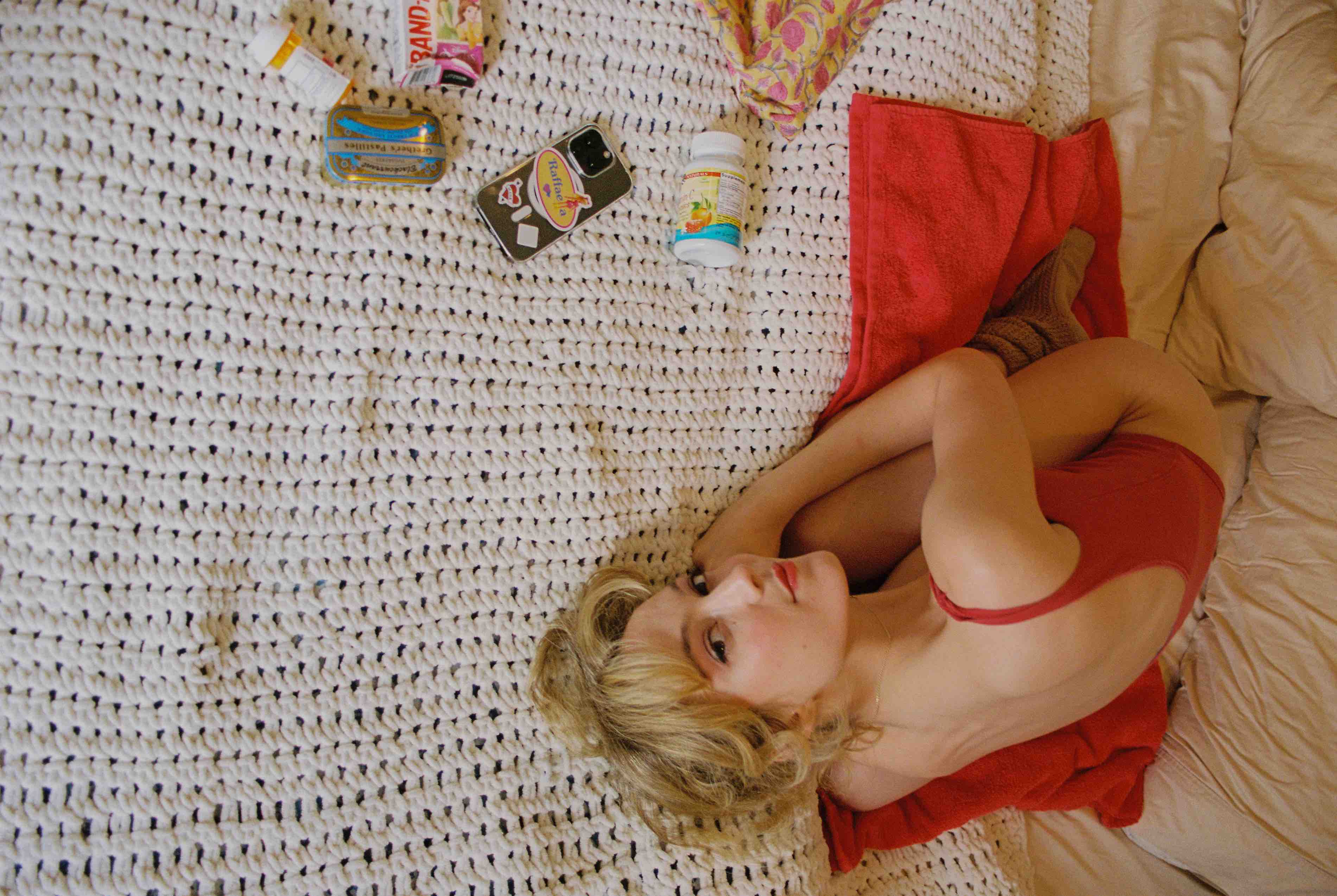Crack open the sticker-coated, candy-colored journal of Raffaella and enter a world of endless puberty, where we’re stretching our babysitting money to cover prom dresses and turning up the boombox to cover our parents fighting. Here, kissing is more intimate than sex, and going blonde is a radical reinvention—because it is. We’re learning, as the title of her two-act EP series says, to Live, Raff, Love in this bildungsrowoman in two acts about coming of age, and then coming of age, again and again and again.
“This whole process of writing this album has been growing up,” Raffaella tells me over Zoom from the home in Minneapolis she shares with her partner and the baby they just adopted after a friend’s daughter unexpectedly got knocked up (fine, I am talking about dogs and puppies, not humans). “Not just learning how to be an adult and learning how to make a flourless chocolate cake and a perfect roasted chicken, but also learning how to surround yourself with the right people and not feel guilty if you feel like maybe some of those people aren’t right.”
Raff (as her reps refer to her in emails) explains that the thinking behind breaking up her debut into two parts is a mix of savvy and insecurity. “It’s a lot to release a whole album as a beginning, growing artist. It’s also kind of intimidating, and I feel like I have to really earn that. I just feel like I haven’t earned my debut album yet.”
Hasn’t earned an album? She’s been putting out music for years! I saw her open for Charly Bliss! She’s about to open for Bishop Briggs and MisterWives! But this is typical Raff: open and honest modesty. Speaking of a tense and complicated relationship that inspired a song, she casually dropped the perfectly clarifying and erudite sentence, “It’s a lot of aphasia, themes of not communicating and having an abyss of language…having not prepared the words at the time maybe allowed me to prepare them later in song form,” then followed it up with, “Or whatever. I don’t know.”
“I probably associate joy with pastel pink and a stuffed animal pig because that’s when joy was clear and pure and there. I’m sure there are Freudian, subconscious incentives there.”
Raffaella’s keen, academic mind pairs surprisingly well with a tween sensibility. Her visuals reflect the recently resurgent Y2K aesthetic, though not in the lightly ironic Sassy magazine style of Olivia Rodrigo. Raffaella hews closer to Claire’s by way of Sofia Coppola (“It’s always been my Achilles heel, nostalgia,” she tells me. “I have a Tamagotchi in my purse. I’ve never used it, but it’s fun to see, it kind of grounds me in a way”). Youthful influences inject songs about difficult feelings with a necessary lightness, connecting the tumult of her twenties to a simpler time. “I’m probably chasing when my parents were still married, which was when I was nine and younger. I probably associate joy with pastel pink and a stuffed animal pig because that’s when joy was clear and pure and there. So I’m sure there are Freudian, subconscious incentives there.”
It’s splashed across her merchandise; I bought a “Child of Divorce” t-shirt after her show when I realized I was the only one in my group who could claim the title. On top of the usual confusion, Raffaella’s parents further muddied the waters by moving back into the same apartment (in separate rooms) four years after they split. That’s plenty to work through—on a therapist’s couch, in your journal, or in the studio. “I think this album is very much me understanding their perspectives, and also appropriating my own, having moved away from living inside that apartment. The ‘child of divorce’ thing is like my badge of honor, writing these love songs and writing these attachment-avoidant personality disorders. It was the umbrella that felt like everything fell underneath.”

If her parents provided the raw emotional material, it was her grandmothers who gave her music as an outlet for those feelings. Both were amateur songwriters: a Juilliard-trained classical pianist on one side, wordplay- and Broadway-lover on the other. Then her two older sisters stepped in to shape her taste. “A lot of Spice Girls, Britney Spears…I was exposed to The Offspring at a really young age,” she recalls. “People would ask me what my favorite song was when I was three and I would start singing, ‘Give it to me baby, aha aha.’ And they were like, ‘This is uncomfortable, you’re three years old.’”
It’s this mix of togetherness and apartness, silly and serious, joy and anger that ultimately informed the shape of Live, Raff, Love, and finding a balance is the real reason it’s structured like, well, Into the Woods. “I thought of everything like a play,” she says. “The first act is really happy and the second act is very dark…and then I realized that you can have depth without darkness.” As in a play, every gun eventually fires, every set-up later pays off.
“I was exposed to The Offspring at a really young age. People would ask me what my favorite song was when I was three and I would start singing, ‘Give it to me baby, aha aha.’”
“I figured out a way to make every song from the first half have a foil for the second half. There’s a song about, ‘I buy my groceries at the grocery store’—this fun way to be like, ‘I’m grown up!’ And then the foil for that would be ‘Polly Pocket,’ which is a song about reproductive rights. It’s still fun, but the context is a lot darker in terms of the depth of what it means to actually exist as a person with a uterus. The song about being delusional, ‘Buick,’ has a foil called ‘Fucking Smiling,’ and it’s my way of rationalizing these two separate parts: seeing one as the light and one as the shadow that provides the depth for that light. It’s like how you exist with a shadow, your shadow is always a little bit bigger.”
Maybe the foil to the chaotic drumroll of the years leading up to 2019 is her current era, which is itself like something out of a Hallmark movie: Cool girl who swore she’d never leave the city finds love in a small town! Only in this story, she doesn’t have to choose between the music and the boy. “I came here with a backpack thinking I was gonna be here for two weeks, three years ago. And now I have a dog and a house and a person that I want to be with forever. I was always like, ‘I don’t believe in marriage, I’m from New York! A child of divorce, fuck that, it’s all fake.’ And now I’m like, ‘Well, ready to get married now actually!’ I believe in this and I never thought that I would.”
Performing music about a much more mixed-up time in her life, then, becomes like slipping on a butterfly-shaped mood ring. “It exists entirely differently according to how I’m feeling that day. Even if I’m feeling sad and it has nothing to do with that song…say I’m singing ‘Lipstick’ one day and I had a really great conversation with the person that that’s about, but I’m PMSing. Maybe a feeling from having written that song will just come up and I’ll get really emotional singing it. It’s this freaky spiritual thing that happens that you don’t have any control over. Sometimes I feel absolutely nothing…sometimes I’m holding back tears, really intensely feeling everything that I’ve ever felt. It’s really spiritual and amorphous and you can’t really predict what’s gonna happen inside your head.
“‘Buick’ is about this person who I have a lot of love for, but he holds no emotional weight whatsoever,” she continues. “And when I wrote it, [I felt] like, ‘Ahh, it’s gonna be sad to lose this person in my life,’ but then I lost that person and every night I sing [about it]…and I don’t really mind. And songs like ‘Lipstick’ and ‘Fucking Smiling’—that friend and I have gotten so strong and our friendship is better than ever and that makes it almost funny to sing now.”
“Sometimes I feel absolutely nothing…sometimes I’m really intensely feeling everything that I’ve ever felt. It’s really spiritual and amorphous and you can’t really predict what’s gonna happen inside your head.”
As for the future, she let slip that the next album might be called Raff, Paper, Scissors. Again, perfectly literate and kid-ish. And she’ll continue to combine the sweet and the heavy, reworking her dissertation on reproductive rights in France through the lens of Simone de Bouvier to something that could accompany “Polly Pocket.”
Approachable, intellectual pop music to soundtrack adolescence is, in fact, the endgame. “One of my dreams has always been that I’ll get to a place by the time I’m 40 where maybe high school teachers will wanna talk about my songs in their class. My freshman year high school teacher, Miss Reynolds, talked to us about how Kesha was subversive once and I was just like, ‘Oh my god, pop music is subversive!’ Something absolutely changed, and having that kind of spark in an academic environment was so exciting to me and it helped me blend my academic world with my implicitly-motivated-by-music world and the art world. It would be cool if people taught my lyrics.”
I’m enrolling immediately. FL







